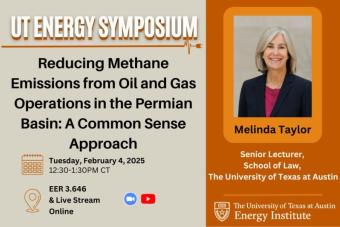Permian Dialog
The Permian Dialog engages UT faculty experts from the Cockrell School of Engineering, Jackson School of Geosciences, and the School of Law, energy companies, financial institutions, and non-governmental organizations in discussions about providing useful information to oil and gas operators about cost-effective ways to achieve efficiencies and emissions reductions.
The Permian Basin, located in West Texas and southeastern New Mexico has experienced significant growth over the last decade in shale oil and gas extraction because of the use of advanced drilling techniques such as hydraulic fracturing and horizontal drilling. The Permian has played a crucial role in making the United States the world’s leading oil and gas-producing region.
Beginning in December 2022, with financial support from the Cynthia and George Mitchell Foundation, Melinda Taylor of The University of Texas School of Law and Tracey Cameron, director of Oil and Gas at Ceres, convened a diverse group of stakeholders who shared the common goal of reducing emissions from the oil and gas industry in the Permian Basin. Guided by cutting-edge research on methane emissions by UT’s Energy Emissions Modeling and Data Lab, representatives of oil and gas companies, industry trade associations, environmental organizations, and financial institutions discussed a range of approaches. The group agreed that providing training and technical support to less-capitalized operators would yield significant, cost-effective environmental and economic benefits.
The Permian Dialog continues to provide participants with an opportunity to identify common-sense techniques to identify leaks, minimize flaring, and reduce pollution to create lower-carbon energy in the Permian Basin.
The dialog has generated two outcomes:
- A program to establish a cooperative methane emissions monitoring network in the Permian Basin, which will produce verified data to ensure that information about emissions is scientifically credible and available to the operators.
- A project to provide smaller, less-resourced operators in the Permian Basin with education, training, and financial assistance to identify leaks and facilitate cost-effective emissions reductions.
Both projects have been awarded funding from the Department of Energy’s Methane Emissions Reduction Program (MERP). The projects will be overseen by an advisory board with representatives from industry, academia, environmental organizations, and members of the communities of the Permian Basin.
Permian Dialog News
- UT Expertise to Reduce Emissions from Oil and Gas and Improve Measurement Accuracy
-
The University of Texas at Austin will play a leading role across multiple projects that collectively seek to drive down methane emissions across oil and natural gas value chains. This series of new nationwide efforts aims to provide technical and financial assistance to small oil and gas operators, find and repair methane leaks, produce accurate measurements of methane emissions and drive mitigation efforts across the energy sector.
Program Contact
Supported By

Videos




